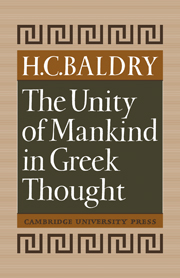Summary
Man, anthrōpos, was the centre of the world for the Greeks, and a review of all they thought about him would involve discussion of most of their literature and art. This book has no such wide scope or ambitious aim. Its theme is not the whole Hellenic conception of man, but the development among the Greeks of ideas about one aspect of humanity-the unity of mankind; an aspect which never had more than a minor place in their thought, although it may seem all–important in the twentieth century a.d.
In our own day human unity is generally seen as a practical problem. We take as a self-evident fact the existence of the human race as a distinct species, an aggregate made up of individuals whose present numbers are approximately known; and with almost equal readiness most of us draw the inference that between all these representatives of homo sapiens there is some sort of kinship or fellowship which should influence their behaviour towards each other. ‘One world’, ‘the human community,’ the brotherhood of man', are phrases on everybody's lips, and their theoretical validity is hardly called in question. The crucial issue, as we see it, is the gap between theory and practice: the paradox of a human race acknowledged in theory to be a single family, yet split by divisions of creed and colour which threaten its destruction. The solution is commonly sought not in reconsideration of the basic theory, but in the practical field of organisation, and attempts at practical world co-operation become more and more a characteristic feature of our time.
- Type
- Chapter
- Information
- The Unity of Mankind in Greek Thought , pp. 1 - 7Publisher: Cambridge University PressPrint publication year: 1965

